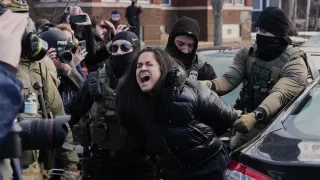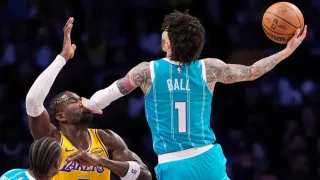June 23, 2021
Frameline45 Documentaries: Cinematic Stories Shine, Sometimes Stall
Brian Bromberger READ TIME: 11 MIN.
While most of the documentaries in Frameline45 are very good, none are great. In a rare occurrence, the narrative features this year are stronger entries than the documentaries.
Another surprise is that 2021 is the 40th anniversary of the onset of the AIDS epidemic, yet few of the documentaries allude to this milestone or are AIDS-related. This isn't a criticism of Frameline, as so far none of the LGBTQ film festivals have featured movies on this topic. Perhaps some documentaries might emerge next year in commemoration of this landmark anniversary.
If one were to pick a theme for the documentaries chosen by Frameline45, it would be a focus on sex positivity, which plays a role in at least six films (Ailey, Baloney, Can You Bring It: Bill T. Jones and D-Man in the Waters, Raw! Uncut! Video! (which does reference AIDS as well), Rebel Dykes, and A Sexplanation).
This might not be unusual in a year when many queer people had to refigure their sexuality in lockdown, unable to express themselves in personal connections with other folks for fear of contracting COVID. All these documentaries ratify the importance of sexuality as helping to form and solidify queer identities, an affirmation we can appreciate as the community comes together in person to celebrate Pride in a few selected events.
Ailey is a long overdue profile of the brilliant, demanding, enigmatic choreographer Alvin Ailey who searched for truth in movement (and a salute to the human body) by centering on African American experiences. Ailey was a pivotal figure in contemporary modern dance, second only to Martha Graham. During his lifetime, his dance company was lauded as one of the most innovative in the world.
The film is largely told in his own words through the creation of a new commission work inspired by his life, aided by insights given by contemporaries such as Ailey's successor Judith Jamison and disciples such as Bill T. Jones. There is stunning footage from his iconic dances (Revelations, Blues Suit), as well as analysis on how his poverty-stricken childhood in Depression-era Texas and never knowing his father influenced his work.
Any civil rights-era protesting Ailey did was on stage rather than in demonstrations. For Ailey, choreography was catharsis, a vehicle for him to tell his truth. However, his truth didn't include coming out as gay, which must have been very oppressive for him, just by the fact when he died of AIDS in 1989, his cause of death was announced not as HIV but as terminal blood dyscrasia.
Ailey is an excellent portrayal of a visionary artist, but is handicapped by only marginal, tangential references to his sexuality and private life. While his blackness rightfully is center stage as a primary motivator on his creativity, his gayness and the impact of being closeted should have been discussed/debated more prominently. Ailey will premiere on PBS's American Masters series later this year.
Baloney is billed as gay all-male revue burlesque and audiences will likely delight in the fun-filled naughty antics of this live theatre troupe, often performing in the Oasis nightclub in San Francisco. Michael Phillis (absolutely adorable), the co-creator and director, defines the 15-year-old group as "a live show that uses theater, dance, striptease to explore and celebrate the gay sexual and life experience."
Baloney explores the power in the vulnerability of exposing oneself not just in the flesh but also one's inner values and conflicts. Baloney's skits are part spoof, confession, and social commentary often involving music and dance (Phillis's partner Rory Davis is the choreographer).
They are often enacted fantasies with no embarrassment, shame, or guilt with the performers representing solicited audience's wish-fulfillments. They provide a safe space forum where everyone can be comfortable with their sexuality and not be afraid for men to explore their femininity.
Clearly the troupe (which includes a woman and a straight guy) all like each other as they take off their clothes to reveal bodies of all sizes and shapes and express mutual affection. The way the revue raised money during the pandemic is both inventive and riotous, not to be spoiled here.
Often enthralling and hilarious, except in certain scenes where the film feels like an infomercial for the group (a minor quibble), this now beloved SF gay tradition deserves exposure –in all senses of the word– and as a result new audiences will discover them.
In tandem with Baloney, A Sexplanation is also titillating entertainment, but more for educative purposes. 36-year-old gay San Franciscan Alex Liu (a cutie pie who declares, "I love dick") is on a mission to strip away his sexual shame and find out the naked truths about sexuality.
Sexplanation is a documentary road picture as Liu travels throughout the country asking researchers about intimacy, overcoming sexual hang-ups, our fear of pleasure, silence in talking about sexuality, and what elements compose good sexual education for schools (i.e. being nonjudgmental, medically accurate information).
To quote Mary Poppins, a spoonful of sugar does make the medicine go down, as Liu covers controversial topics (i.e. porn, fetishes) with a smiling, charming disposition and a breezy unassuming style even in potentially cringeworthy scenes, such as questioning his own parents about their sexuality.
One amusing sequence is Liu asking experts at the University of British Columbia in Vancouver how they define sex, and they're all tongue-tied. Audiences will fall in love with Liu and his campaign to end the silence that keeps sexual shame alive with the notion sex is dirty or wrong.
Although there is some gay content, the film deals with a broader view of sexuality so it will appeal to straight as well as queer viewers. Sexplanation should be required viewing for parents, and with the editing of a few explicit scenes, could be ideal for high school sex education courses, the film you wished you had seen when you were an adolescent.
On the other end of the spectrum is the harrowing Prognosis: Notes on Living, with Oscar-winning San Francisco lesbian documentary trailblazer, Debra Chasnoff (It's Elementary, Deadly Deception) turning the camera on herself after she received a diagnosis of stage-4 breast cancer.
The film examines how she dealt with her devastating illness. Her bravery, candor, humor, and tremendous vulnerability area are a tribute to her filmmaking skills. This documentary is not for the faint-hearted, especially because we know Chasnoff died in 2017 at age 60. Her final unnerving deathbed moments feature prominently in the movie.
If you have journeyed with anyone facing a fatal illness or are taking on that challenge now, Prognosis may or may not be helpful emotionally. However it is honest, unsentimental in its unsparing look at dying and the letting go process, though we feel like voyeurs as Chasnoff, at times, emotionally unravels.
Ultimately the film serves as a capstone on Chasnoff's professional legacy, but also a window into how people cope with life-changing diagnoses. This is not the type of film one 'likes' but it is one we're grateful was made, in spite of how gut-wrenching it is to watch.
Haunting is the word to describe the almost undefinable North By Current, shot by trans filmmaker Angelo Madsen Minax. Originally Minax meant his doc to be an exposé on a corrupt criminal justice system following the death of his two-year-old niece Kalla, with his sister Jesse charged with child abuse and her husband convicted of murder (ultimately acquitted).
Instead, North focuses more on the pain of family and grief, but not just related to death but the family coming to terms with Minax's transition. He uses a first person cinema verité style that is experimental, raw, non-linear, and disjointed to convey the idea time has no meaning.
Minax returns to the barren landscape of his rural northern Michigan family, following them over a five-year period as they cope with Kalla's death, prison, opioid addiction, spousal abuse, economic stagnation, depression, Mormon fanaticism, with Jesse blaming him for her addiction and his mother saying he is God's punishment for having past abortions.
Minax employs home movies, photos, and narration by an ethereal ghost child spouting platitudinous wisdom (questionable), to create this impressionistic visual essay to show how far the family has come since the loss of Kalla and their tentatively closer relationship to him.
Courageous and moving at times, it is also brutal and there is so much tragedy happening it can overwhelm the viewer, though ultimately it is life-affirming.
Minax's relationship and interviews with Jesse provide the key mostly uplifting moments in the film. North won't appeal to everyone, but if you persevere through the pain, you will be amply rewarded, as its unflinching honesty will linger in your memory for days.
Inspired by Justin Hall's award-winning anthology of queer comics covering the period from the underground late 1960s to the late 2000s, No Straight Lines: The Rise of Queer Comics traces the influence of this art form and how it overcame homophobia and commercial unfeasibility to become a popular mode of contemporary LGBTQ storytelling.
We hear about Mary Wings's creation of Come Out Comics, the first lesbian comic made by an out lesbian and Rupert Kinnard's Brown Bomber, the first black queer comic character.
However, the pivotal figure is the late Howard Cruse, whose 1980s anthology Gay Comix opened doors for out gay and lesbian cartoonists, but is beloved for his Wendel comic strip that ran in The Advocate. It dealt with AIDS, gay rights, gay-bashing, closeted celebrities, among other communal topics using the right balance between humor and anger.
Alison Bechdel shines in her segment into how she created her award-winning best-selling Fun Home, a graphic memoir on her gay father, which later became a hit Broadway musical.
In short snippets we experience young up-and-coming queer artists, such as Ivan Velez Jr. Breena Nunez, and Gaia WXYZ appreciate how these trailblazers influenced their own work and help them find their distinctive voices. The film is proficient at showing how comics especially in the 80s and 90s helped form the identity of the queer community as they experienced pain, loss, and fought for visibility and relevance.
The presentation here is periodically disjointed, expecting the audience to fill in chronological gaps, but ultimately any lapses are forgiven because we get to see so many enlightening and entertaining comic strips, as we realize how revolutionary they were for their time.
If you are in need for some uplift, you can do no better than watch Yana Ugrekhelidze searing documentary, Instructions for Survival, on the plight of Alexander, a transgender man in Georgia (the country, not the U.S. state).
Listed as female on his passport that prevents him from legally finding work, Alexander, after googling the correct medical information must secure his necessary hormonal therapy from black market suppliers, forcing him to lead a life of secrecy, even from his neighbors.
Like Russia, Georgia is oppressive for LGBTQ people, with the documentary's opening highlighting video clips showing crowds attacking a bus with pro-queer activists and a talk show host advocating death for LGBTQ folk.
Fortunately Alexander has a supportive cis woman partner, Mari, and biological family. Alexander and Mari realize their survival (Mari's relatives want her killed) depends on their leaving Georgia. Desperate, Mari agrees to become a surrogate for $12,000, money they can use to escape and start a new life in Belgium.
Both Alexander and Mari grow attached to the unborn child. While more coverage about the political background of queer Georgian citizens might have been useful, Ugrekhelidze's guerilla-like cinema verité creates suspense, but its most enduring element is the love bond between Alexander and Mari despite their lack of money and hatred shown them. They will become your new queer heroes in this sensitive, compassionate plea for humanizing the plight of queer migrants seeking asylum just to live ordinary lives.
Fanny continues the recent trend in documentaries of filling in the gaps of rock and roll history by resurrecting groups that were ignored or overlooked such as Big Star (Nothing Can Hurt Me) and '60s back-up singers (Twenty Feet From Stardom).
Fanny originated in 1960s Sacramento when two Filipina sisters, June and Jean Millington, along with their friends, transformed themselves from a garage band to become the first all-women hard rock group to release an LP with a major record label (Warner/Reprise, 1970) long before The Go-Gos or The Bangles.
They released five critically-acclaimed albums in five years, toured with famed bands such as Chicago, amassed a dedicated fan base, and were lauded by David Bowie. When they were disbanded in 1975 they were promptly forgotten, their landmark accomplishment written out of the history books, no doubt due to sexism, racism, and homophobia (some members were lesbian).
Fanny never produced a pop song hit, which prevented them from being aired on the crucial AM radio format, perhaps securing their anonymity. Using a traditional approach boasting incredible archival performance footage, Canadian director Bobbi Jo Hart interviews current and former band members, as they prepare to release a new reunion CD (Fanny Walked the Earth) in their sixties and begin a tour to promote it.
Bonnie Raitt, Cherie Currie (The Runaways), Kate Pierson (B-52s) sing the praises of these "bunch of hands-on chicks" and why they deserve to be remembered.
Unfortunately, due to circumstances beyond their control, the triumphant conclusion the filmmakers were aiming for is thwarted leading to an anticlimactic conclusion. Still, Fanny reminds us of the unsung role played by queer musicians in establishing rock n roll that should be celebrated and not minimized.
Another overlooked group are lesbian singer-songwriters who have written some of the greatest songs in country music yet were forced to keep their private lives secret in a homophobic industry, but their story is finally being told in Invisible. As Bonnie Baker remarks, "Instead of writing songs for others telling their stories, I finally get to tell my story."
In addition to Baker, Cidney Bullens, Dianne Davidson, Kye Fleming, Mary Gauthier, Jess Leary, Cheryl Wheeler, Pam Rose among others are profiled. These women wrote hits for Barbara Mandrell, Johnny Cash, Willie Nelson, Reba McEntire, Tim McGraw to list a few stars.
Many of these women attempted careers of their own, but were petrified of being outed which would have led to certain rejection from their conservative audiences and a ban on crucial radio play by country western stations, ending their musical dreams.
Chely Wright's story is especially tragic, as she planned a big promotional coming out event on The Today Show, along with a documentary (Wish Me Away) on being lesbian, yet was flatly rejected by everyone, such that she had to resort to a GoFundMe campaign with her fans so her next album could be released.
The problem is that all these stories repeat the same grim circumstances and conclusions over and over again, resulting in a documentary that is overlong and tedious at times. Still, audiences can't help but admire these persevering women some of them trying to kickstart a singing career in their 60s and 70s. And lots of sensational songs will keep you humming long after the last credit disappears.
Nostalgia is also in the air in Lisa Immordino Vreeland's (superb docs on Diana Vreeland, Cecil Beaton, and Peggy Guggenheim) evocative Truman and Tennessee: An Intimate Conversation, in which she skillfully recreates the tumultuous friendship of these two gay literary stars of the 1950s and 1960s.
She's cleverly assembled a dialogue between them (without talking heads) by using their writings, clips from screen adaptations of their works (A Streetcar Named Desire, Breakfast at Tiffany's) as well as their appearances (not always flattering) on television talk shows hosted by Dick Cavett and David Frost.
Their words are read by out actors Zachary Quinto voicing Williams and Jim Parson breathing life into Capote. They wrote letters to each other when they weren't competitive rivals or frenemies. Besides breathtaking talent, they shared similar self-destructive demons such as lonely childhoods filled with abuse, alcoholism and substance abuse, homophobia, and a long period of decline in the 1970s. Both died of addiction issues within 18 months of each other.
All these problems fueled their greatest works as well as contributed to their downfalls. Both were witty wordsmiths, born raconteurs, and had outsized personalities ideal for television when writers were honored guests on talk shows. Immordino uses their own words to disclose how they both felt about being gay during a repressive time and the difficulties of finding lasting love.
Probably most revealing are their discussions about the creative process and their compelling need to write. Yet truthfully there is little insightful or original we haven't encountered elsewhere, but what the documentary establishes is how they constructed personas that prevented other people from getting to know their real selves. They wanted to remain elusive and so they do in this heartbreaking yet intriguing look into two of the greatest gay writers of the 20th century.
Help keep the Bay Area Reporter going in these tough times. To support local, independent, LGBTQ journalism, consider becoming a BAR member.






